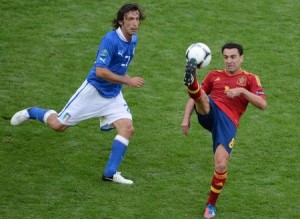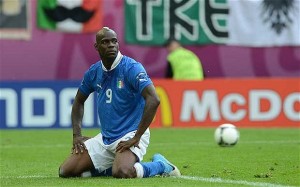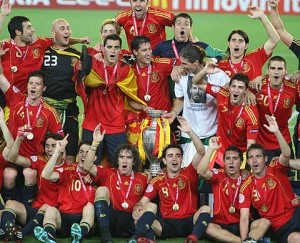After 30 games played and 72 goals scored, just one match remains in the UEFA Euro 2012 tournament. In a rematch from the group stage, reigning World Cup champion Spain will attempt to defend its Euro crown against an Italian team that appears to be peaking just at the right time. Can La Furia Roja take home yet another major tournament title? Or will Mario Balotelli and the Azzurri claim Italy’s second European Championship? With the title match kicking off Sunday afternoon, here’s what you can expect to see from these European powers.
What we learned from the first game
Spain’s first clash with Italy two and a half weeks ago may have been its biggest challenge of the tournament to date. The Spanish conceded their only goal of the tournament early in the second half and needed an equalizer from Cesc Fabregas to avoid an opening game defeat. Though Spain still dominated possession, Italy created more shot attempts (10) and put more shots on target (6) than any other team Spain has faced this tournament, even as striker Mario Balotelli offered his worst performance of the Euros.
Though Portugal took the Spanish all the way to penalties, they never threatened the goal the way Italy did in the opening group stage match. Should the Italians duplicate their finishing brilliance from the semifinal against Germany, Spain could again fall behind the Azzurri.
Can Italy’s killer instinct continue?
Sure, Balotelli displayed fantastic goal-scoring efficiency against Germany, burying both of his great chances with authority. But who says he can do it again? Thanks to shaky performances early, he has only played one full match this tournament (against England), as he’s been subbed out multiple times and even came off the bench against Ireland. Before his explosion against Germany, Balotelli had managed just one goal despite taking 21 shots this tournament, by far the worst ratio of any goal scorer in Euro 2012.
Likewise, entering the semifinals, the Italians had tallied 50 shots on goal but scored just four times all tournament, a ratio that ranked dead last among the 16 teams that qualified. And while newfound confidence may be a helpful factor—especially for a young but erratic talent like Balotelli—the finishing failures that have plagued Italy throughout the Euro can’t possibly just disappear.
And who will do the scoring for Spain?
In case we needed more evidence that Spain’s striker situation remains unsolved, Fernando Torres didn’t even step on the field during the 120-minute semifinal against Portugal. His two-goal performance against Ireland seems like a distant memory, as manager Vicente del Bosque seems to have more confidence in his committee of midfielders filling the striker role left by the absence of David Villa.
But even a collection of the world’s best midfielders hasn’t been particularly threatening. Excluding the 4-0 drubbing of an overmatched Irish squad, Spain has managed just four goals in four games, one of which came on a meaningless penalty in stoppage time versus France. And don’t forget their recent history of low-scoring efforts in big games—despite winning each game, they converted only three goals in the 2008 Euro final, 2010 World Cup semifinal and final, and 2012 Euro semifinal combined. Against an Italian defense that has conceded just three times in five matches, it wouldn’t be shocking to see the Spaniards held off the score sheet.
So what happens? And who wins?
The style of play should resemble the majority of Spain’s matchups. Del Bosque’s squad will, as usual, dominate possession and search for the perfect combination inside the Italian box, while Italy will probably create its best chances on the counterattack. On such a giant stage, an early goal by either side could work wonders to open up play; should Italy tally first, more quality counterattacking opportunities would arise over time, while an early goal for Spain could draw Italy out of its defensive shell and make goals more likely on both ends.
Still, an offensive contest is far from likely. Like the 2010 World Cup final, we may enter extra time scoreless and hoping for a goal to prevent a deciding penalty shootout.
For Spain, that goal will ultimately arrive, with World Cup hero Andres Iniesta feeding an open Jordi Alba for the tournament winner, clinching an unprecedented second consecutive European championship and third consecutive major tournament title for Spain.
How long will La Furia Roja’s historic run last? We may have to wait for World Cup 2014 to find out.




